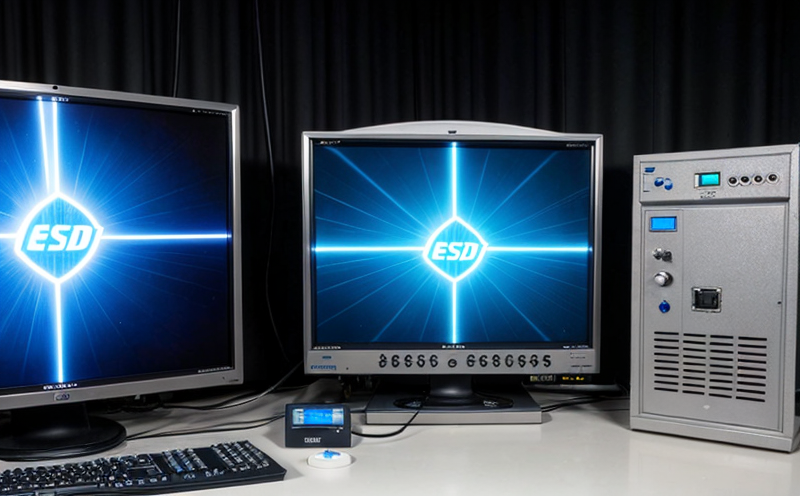IEC 61000-4-12 Ring Wave Immunity Testing
The IEC 61000-4-12 standard addresses electromagnetic compatibility (EMC) and is specifically designed to evaluate the immunity of electronic systems, components, and equipment against transient phenomena. Ring wave immunity testing, under this standard, assesses a device's ability to function correctly when exposed to specific types of transient electromagnetic disturbances that can occur in industrial environments.
These disturbances are characterized by their short duration and high peak power. The ring wave is one such disturbance, which follows an exponential decay after reaching its peak value. This form of disturbance is common in industries dealing with heavy machinery, electrical motors, and other devices that generate significant electromagnetic emissions during operation.
The testing process involves subjecting the device under test (DUT) to a controlled environment where these transient disturbances are simulated using specialized equipment such as transient generators or signal injectors. The DUT is placed in a specially designed chamber where it is exposed to the ring wave disturbance, and its performance is monitored for any anomalies.
One of the critical aspects of this testing is the careful preparation of the specimen (the device under test). This includes ensuring that all connections are properly made and that the DUT is configured in a manner consistent with real-world conditions. The specimen should be placed on a grounded test fixture to ensure proper grounding, which minimizes spurious emissions and ensures accurate measurement.
The testing apparatus typically consists of a transient generator capable of producing ring wave signals with defined parameters such as peak voltage, rise time, decay time, and repetition rate. These parameters are crucial in simulating real-world conditions accurately. The signals generated by the transient generator are then injected into the DUT using appropriate probes or cables.
The acceptance criteria for this testing are stringent and are based on international standards such as IEC 61000-4-12. These criteria specify the maximum permissible levels of disturbances that a device can withstand without failing to perform its intended function. Compliance with these criteria ensures that the tested device is robust enough to operate correctly in environments where transient phenomena occur.
Real-world applications of IEC 61000-4-12 Ring Wave Immunity Testing are widespread across various sectors, including automotive, aerospace, and industrial automation. In the automotive industry, for instance, it ensures that vehicle electronics can withstand the electromagnetic disturbances generated by the engine and other electrical systems. Similarly, in industrial environments, this testing is crucial for ensuring that control systems and sensors remain operational despite the presence of transient phenomena.
The importance of ring wave immunity testing cannot be overstated, especially given the increasing complexity of modern electronic devices. With more integrated circuits packed into smaller spaces, the risk of electromagnetic interference (EMI) has also increased. Therefore, compliance with this standard is not just a regulatory requirement but also a best practice for ensuring product reliability and safety.
Understanding the nuances of ring wave immunity testing involves not only knowing the theoretical aspects but also gaining practical experience in setting up and interpreting test results. This knowledge is essential for quality managers, compliance officers, R&D engineers, and procurement personnel who are responsible for selecting and specifying components that meet these rigorous standards.
Benefits
Enhanced reliability of electronic devices in harsh industrial environments.
Compliance with international standards ensures market access and regulatory compliance.
Avoidance of costly product recalls due to failure under transient conditions.
The IEC 61000-4-12 Ring Wave Immunity Testing provides significant benefits by ensuring that electronic devices can withstand the rigors of real-world environments. This testing not only enhances reliability but also ensures compliance with international standards, thereby facilitating market access and regulatory compliance.
Eurolab Advantages
At Eurolab, we offer comprehensive IEC 61000-4-12 Ring Wave Immunity Testing services that are unparalleled in the industry. Our state-of-the-art facilities and experienced technical staff ensure that your devices undergo rigorous testing to meet stringent international standards.
Accurate simulation of real-world transient phenomena using advanced test equipment.
Experienced technicians with deep expertise in EMC testing protocols.
We pride ourselves on our ability to provide reliable and consistent results that are essential for ensuring the quality and reliability of your products. Our commitment to excellence ensures that you can trust us to deliver accurate test results every time.
International Acceptance and Recognition
The IEC 61000-4-12 Ring Wave Immunity Testing is widely recognized and accepted in industries worldwide. This standard ensures that products meet the rigorous requirements for electromagnetic compatibility, which is essential for their safe and reliable operation.
Compliance with this standard is crucial not only for ensuring product quality but also for gaining market access in countries that adhere to these international standards.
The widespread acceptance of the IEC 61000-4-12 Ring Wave Immunity Testing ensures that products are robust enough to operate correctly under transient phenomena. This standard is recognized by regulatory bodies and industry leaders, making compliance a strategic necessity for manufacturers.





